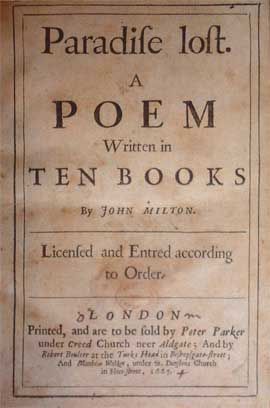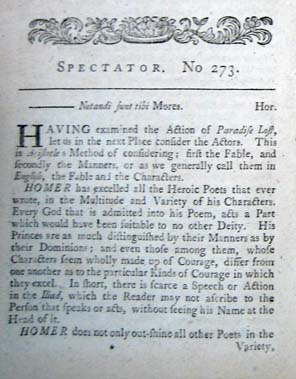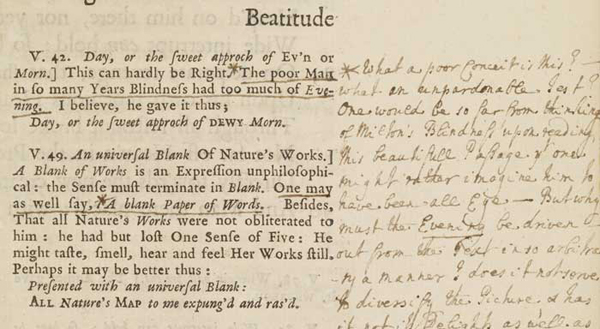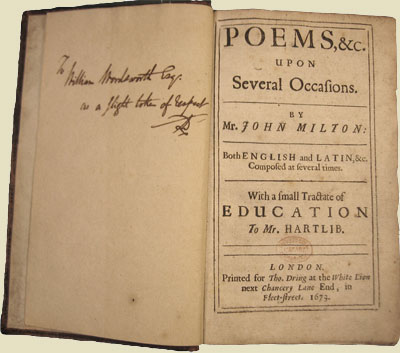 |
MILTON AND THE CRITICS:The Reception of Paradise Lost
PublicationIn 1667 John Milton published Paradise Lost, perhaps the greatest long poem in the English language. It was recognised as an extraordinary achievement shortly after it appeared, and has, in the three hundred and fifty years that people have been reading and thinking about it, provoked a great deal of critical debate. Despite its current canonical status, a favourable reception for Paradise Lost in the late seventeenth century was no foregone conclusion, and its reputation has fluctuated surprisingly ever since. With the restoration of the monarchy in 1660, Milton was out in the cold: as a staunch republican, a supporter of Cromwell and an apologist for the regicide, he was lucky to escape execution for treason. His unorthodox views on various sensitive subjects, including divorce (he was in favour) were well known: Milton was an active writer of political pamphlets as well as a poet, and he had many influential enemies. England in 1667 was reeling from the events of the previous year, when plague and fire had swept the capital, causing a devastation many people thought was divinely inspired; a biblical epic from a blind, grim old controversialist was by no means certain of being sympathetically received, as the poet's wish that his poem might 'fit audience find, though few' (VII.31) perhaps recognises. In spite of this unwelcoming climate, when Paradise Lost appeared, it was hailed as a work of genius, even by Milton's political opponents. The audience was not few, but was it fit?
Contemporary ResponseFrom the start, this epic poem attracted a number of disobedient readers. One of the first major responses was an adaptation for the stage by John Dryden, The State of Innocence (1671). He sought and received Milton's permission to put Paradise Lost into rhyme (unconvinced, presumably, by the comments on the 'troublesome and modern bondage of rhyming' in the note on the verse), and his version outsold the original until the end of the seventeenth century. Dryden's political affiliation (he was a royalist) prompted him to play on a crux in Milton's poem: Satan, who disdains servitude and tries to overturn his monarch, becomes in Dryden's rewriting an unmistakeable portrait of Oliver Cromwell, the king-killer. He also believed that the fallen angel, and not Adam, was the hero (in the sense of his structural position as the protagonist of the epic), and weighted his adaptation accordingly. This was not an isolated instance of wishful interpretation. Contemporary readers who thought there was a whiff of sulphur about the unrepentant republican poet were not surprised to find these sentiments in the mouth of the arch-fiend; and there were those who believed that Milton was in fact disowning his previous stance by associating it with Satan. Neither reading does justice to the complexity of Paradise Lost, but this does identify what was to become a recurrent theme in later responses to the poem: the contested interpretation of Satan, its eloquent anti-hero.
The Early Eighteenth CenturyMilton's epic achieved classical status in the last years of the seventeenth century, when it was published with explanatory notes - the first poem in English to be so presented. Twenty years later, its position was consolidated by an influential series of articles written by Joseph Addison in the Spectator (a daily paper). This, however, did not protect the poem from interference: in 1732, Richard Bentley (one of the earliest textual critics in England) produced an 'emended' edition, in which he argued that the blind poet had employed an incompetent amanuensis, and that as a result many errors of wording and logic had crept into the published version. Bentley's unjustified and insensitive revisions attracted widespread ridicule - not least from Alexander Pope, who pilloried him in the Dunciad (a satire against dull poets). These revisions reflected, however, a feeling that Paradise Lost, though a national classic, was somehow unorthodox in its theological and philosophical outlook. Pope's poem, and indeed his earlier work Rape of the Lock, show another kind of response to Milton. They are 'mock-epics', and re-deploy elements of Milton's style (and, of course, that of his classical antecedents) to comic ends. Milton's achievement was felt to be so great that no contemporary poet could rival or match it: writing a serious epic would be out of the question.
Romantic Milton
At the end of the eighteenth century and the start of the nineteenth, the complex poetic response to Paradise Lost turned once again to the figure of Satan. Milton was hugely important for the Romantic poets, for his political stance as well as the model of his writing. As far as Coleridge was concerned, he sat, with Shakespeare, on 'one of the two glory-smitten summits of the poetic mountain'. Though some writers, notably John Keats, were uneasy under his influence, Milton was widely read and highly regarded. 'Milton!', William Wordsworth opens his sonnet on London, 'thou shoulds't be living at this hour:| England hath need of thee'. Such straightforward veneration, however, was not to be the lasting legacy of Romantic interpretations. William Blake voiced a thought that had been troubling readers almost since the poem's publication, and has dogged it ever since. Noticing that Books I and II are rather more absorbing than Book III, Blake concluded: 'The reason Milton wrote in fetters when he wrote of Angels and God, and at liberty when of Devils and Hell, is because he was a true Poet and of the Devil's party without knowing it'. Whatever Milton's intention - and Blake here concedes that the effect was not deliberate - the power of the poetry glamorizes the figure of Satan at God's expense. Shelley went further; ignoring the theological constraints of Milton's framework, he considered the divine and the diabolic as literary characters, and decided that Satan came out rather better. 'Milton's Devil as a moral being' is, he writes, 'far superior to his God'. Satan's noble striving against immense adversity, his valorization of the individual, had greater appeal than what Shelley read as God's cold and certain execution of the preordained plan of the devils' (and Man's) destruction. Such an impression, Shelley believed, could not have been accidental: 'this bold neglect of a direct moral purpose is the most decisive proof of the supremacy of Milton's genius'.
Critical ControversyBlake's and Shelley's views, corroborated by Satan's powerfully persuasive rhetoric, have enjoyed some currency with subsequent readers, though the Romantics' admiration has not always been echoed along with their interpretations. The early years of the twentieth century saw the study of English literature institutionalized as a degree subject in the universities: an enterprise to which Milton, in some ways the country's first classic poet, might have been central. There emerged, however, a growing antipathy towards Milton's 'stifling' presence, and it expressed itself in a desire to dislodge him from the pre-eminent position he had come to occupy. F. R. Leavis, an influential Cambridge critic and teacher, had little time for Milton. T. S. Eliot objected to Milton as a man ('Milton is unsatisfactory'), as a poet ('Milton writes English like a dead language'), and as an inspiration ('Milton's bad influence may be traced much further than the eighteenth century'). Milton found a passionate advocate in Christopher Ricks, whose seminal 1967 work Milton's Grand Style still, however, needed to adopt a defensive stance. Harold Bloom, writing a few years later, proposed Milton's very mastery of the language as an explanation for these responses; he is, Bloom believes, 'the great Inhibitor, the Sphinx who strangles even strong imaginations in their cradles'. Serious objections to Milton's style and his place in the canon were not generally sustained. But the years that followed saw a new iteration of the old dispute over the interpretation of Paradise Lost. The poem was accepted as a great work, but the reasons for this greatness were contested. In Milton's God (1961), William Empson set about refuting the attempts of C. S. Lewis and others to rehabilitate the character of God and to maintain that Milton succeeded in his avowed intention to 'justify' the divine purpose. Empson concluded, after an idiosyncratic and spirited demolition of God's motives and actions, that 'the reason why the poem is so good is that it makes God so bad'. The critical battle lines were firmly drawn, and no negotiation seemed possible. Either Milton was on God's side and any attempt to suggest otherwise was unchristian and perverse, or Paradise Lost was a veiled critique of the heavenly hierarchy, and Satan's charisma and plausibility a result of Milton's sympathy for his plight. In 1967, Stanley Fish published Surprised by Sin: The Reader in Paradise Lost, which tried to reconcile these opposing viewpoints by arguing that the true hero of the poem is in fact the reader: seeing God as malevolent or Satan as attractive is simply an indication of a fallen state, and part of the poem's purpose. Fish was not entirely successful (his book provoked much controversy of its own) and these disputes have not, even now, been resolved. In the last decades of the twentieth century there was a movement away from addressing the question directly, and works on Milton's theology (e.g. Robert Entzminger's Divine Word), politics (e.g. Milton and Republicanism, a collection edited by Quentin Skinner, among others) and language (e.g. John Leonard's Naming in Paradise) started to take precedence. New and important works on Milton continue to appear, and testify to the centrality in the canon of this rich and difficult epic. There is, it seems, still much to say about Paradise Lost.
READ UP ON OTHER ASPECTS OF PARADISE LOST...
|
| Copyright © 2008 Christ's College |
 |



